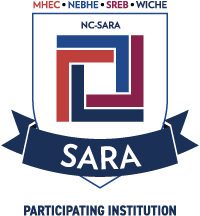Plan Your Education
How to Apply
Moderate Disabilities Tracks
In addition to the criteria below, applicants must meet general graduate admission requirements.
- A statement of purpose explaining the applicant’s reasons for pursuing graduate study in the field of moderate disabilities. This statement should have two parts:
- an initial section of up to 300 words describing your reasons for wishing to pursue graduate studies
- a second section of approximately 1,200 words describing your specific interests, the kind of work you intend to perform, and your goals within the program to which you are applying
- A distinguished undergraduate transcript, with a minimum grade point average of 3.0.
- Two letters of recommendation submitted by individuals who are knowledgeable about teaching students with disabilities, who have worked closely with the applicant, and who have direct knowledge of the applicant’s teaching skills and academic performance.
- A writing sample indicating the applicant’s ability to write in a clear, concise, and professional manner. This sample may be in the form of a recent term paper or research paper. The writing sample should NOT be an Individualized Education Program (IEP), an evaluation report, and a lesson/unit plan. The College of Education and Human Development has as its basic goal that the students who graduate are thoughtful and responsive educators, committed to change for social justice. NOTE: This writing sample is in addition to the statement of intent requirement for the Special Education Program.
Transition Leadership Track
In addition to the criteria below, applicants must meet general graduate admission requirements.
- Letter of Intent: This letter must clearly explain the applicant’s reasons for pursing a graduate study in the field of Transition Leadership.
- Grade Point Average: A minimum cumulative undergraduate GPA of 3.0 is required for admission to the program.
- Letters of Recommendation: Two letters of recommendation must be submitted by persons who are knowledgeable about supporting students with disabilities, who have worked closely with the applicant, and who have direct knowledge of the applicant’s transition skills and academic performance.
- Copy of appropriate licensure: Must be license to teach students with moderate disabilities, students with severe disabilities, students with visual impairments, or students who are deaf or hard of hearing; School Guidance Counselor or School Social Worker/School Adjustment Counselor; are licensed as a Rehabilitation Counselor (as described in 262 CMR 4.00 Requirements for Licensure as a Rehabilitation Counselor); or have certification as a Rehabilitation Counselor as determined by the Commission on Rehabilitation Counselor Certification
- Academic writing sample: A writing sample indicating the applicant’s ability to write in a clear, concise, and professional manner is needed. This sample may be in the form of a recent term paper. A priority for the School for Global Inclusion and Social Development is that the students who graduate are thoughtful and responsive educators, and committed to change for social justice. Please ensure that your writing sample demonstrates how you and your work match such a description. Your writing sample should also exemplify the experiences or values in your life that match this philosophy.
Deadlines & Cost
Deadlines: June 15 for fall, December 1 for spring (Note: The Transition Leadership track will not be accepting applications for Spring 2026)
Application Fee: The nonrefundable application fee is $75. UMass Boston alumni and current students that plan to complete degree requirements prior to graduate enrollment can submit the application without paying the application fee.
Estimate Your Program Cost: Get a feel for your expected program costs using the Graduate Program Cost Calculator.
Program Cost Information: For more detailed information on costs, please visit the Bursar's website.
Curriculum: Successive Licensure in Moderate Disabilities PreK-8 and 5-12 Tracks
Required Courses (24 Credits)
- EDC G 650 - Rethinking Equity and Teaching for English Language Learners 3 Credit(s)
- SPE G 607 - Behavioral and Classroom Management 3 Credit(s)
- SPE G 621 - Introduction to Disabilities for Educational Professionals 3 Credit(s)
- SPE G 624 - Standardized Assessments for Students with Moderate Disabilities, PreK-12 3 Credit(s)
- SPE G 629 - Consultation and Interpersonal Skills 3 Credit(s)
- SPE G 630 - Building Collaborative Partnerships with Families of Students with Disabilities 3 Credit(s)
- SPE G 633 - Legal and Political Issues in Special Education 3 Credit(s)
- SPE G 684 - Computers in Special Education 3 Credit(s)
Track Courses (6 Credits)
Complete two courses from one of the tracks below.
PreK to 8 Track:
- SPE G 625 - Reading and Writing Assessment and Instruction for Students with Moderate Disabilities, Pre K-8 3 Credit(s)
- SPE G 626 - Math, Science, and Social Science Assessment and Instruction for Students with Moderate Disabilities 3 Credit(s)
5 to 12 Track:
- SPE G 631 - Clinical Teaching: Secondary 3 Credit(s)
- SPE G 632 - Alternative Strategies 3 Credit(s)
Practicum Course (6 Credits)
- SPE G 698 - Moderate Practicum 3-6 Credit(s)
Capstone Course (3 Credits)
- SPE G 692 - Capstone Research Seminar in Special Education: Professional Licensure 3 Credit(s)
For more information on curriculum, including course descriptions and degree requirements, visit the Academic Catalog.
Curriculum: Non-Licensure in Moderate Disabilities PreK-8 or 5-12 Track
Required Courses (24 Credits)
- EDC G 650 - Rethinking Equity and Teaching for English Language Learners 3 Credit(s)
- SPE G 607 - Behavioral and Classroom Management 3 Credit(s)
- SPE G 621 - Introduction to Disabilities for Educational Professionals 3 Credit(s)
- SPE G 624 - Standardized Assessments for Students with Moderate Disabilities, PreK-12 3 Credit(s)
- SPE G 629 - Consultation and Interpersonal Skills 3 Credit(s)
- SPE G 630 - Building Collaborative Partnerships with Families of Students with Disabilities 3 Credit(s)
- SPE G 633 - Legal and Political Issues in Special Education 3 Credit(s)
- SPE G 684 - Computers in Special Education 3 Credit(s)
Track Courses (6 Credits)
Complete two courses from one of the tracks below.
PreK to 8 Track:
- SPE G 625 - Reading and Writing Assessment and Instruction for Students with Moderate Disabilities, Pre K-8 3 Credit(s)
- SPE G 626 - Math, Science, and Social Science Assessment and Instruction for Students with Moderate Disabilities 3 Credit(s)
5 to 12 Track:
- SPE G 631 - Clinical Teaching: Secondary 3 Credit(s)
- SPE G 632 - Alternative Strategies 3 Credit(s)
Electives (6 Credits)
Complete two additional courses approved by your advisor.
Capstone Course (3 Credits)
- SPE G 692 - Capstone Research Seminar in Special Education: Professional Licensure 3 Credit(s)
Curriculum: Transition Leadership Track
Transition Leadership Courses (15 Credits)
- SPE G 654 - Youth Development and Self Determination 3 Credit(s)
- SPE G 655 - Career Development and Competitive Employment 3 Credit(s)
- SPE G 656 - Postsecondary Education for Students with Disabilities 3 Credit(s)
- SPE G 657 - Transition Topics 3 Credit(s)
- SPE G 658 - Transition Leadership 3 Credit(s)
Special Education or Critical Thinking Courses (6 Credits)
- SPE G 629 - Consultation and Interpersonal Skills 3 Credit(s)
OR CRCRTH course - SPE G 684 - Computers in Special Education 3 Credit(s)
Education Course (3 Credits)
- EDC G 606 - Sociocultural Foundations of Education 3 Credit(s)
Rehabilitation Counseling Courses (6 Credits)
- REHAB 603 - Foundations of Rehabilitation 3 Credit(s)
- REHAB 612 - Vocational Rehabilitation and Placement 3 Credit(s)
Capstone Course (3 Credits)
- SPE G 693 - Practicum: Transition Leadership I 3 Credit(s)
Graduation Criteria
Successive Licensure in Moderate Disabilities PreK-8 or 5-12 Track
Complete 39 credits from twelve courses including eight required courses, two track courses, one practicum course, and one capstone course.
Track: Students must choose a track in PreK to 8 or 5 to 12.
Capstone: Completion of a written paper and oral presentation as part of SPE G 692.
Field experience: Complete 75 hours of monitored pre-practicum field-based experience, and a minimum semester-long supervised practicum (including hours in an inclusive setting).
Statute of limitations: Five years.
Non-Licensure in Moderate Disabilities PreK-8 or 5-12 Track
Complete 39 credits from 13 courses including eight required courses, two track courses, two electives, and one capstone course.
Track: Students must select a track in PreK to 8 or 5 to 12.
Capstone: Completion of a written paper and oral presentation as part of SPE G 692.
Statute of limitations: Five years.
Transition Leadership Track
Complete 33 credits from eleven courses including five transition leadership courses, two special education or critical thinking courses, one education course, two rehabilitation counseling courses and one capstone course.
Capstone: Completion of a practicum as part of SPE G 693.
Statute of limitations: Five years.
Contact
Graduate Program Director Kristin Murphy
kristin.murphy@umb.edu
(617) 287-4516

Curriculum & Instruction
Learn more about UMass Boston's Curriculum & Instruction department, our research, and our faculty.
Explore the Department of Curriculum & Instruction
College of Education & Human Development
Learn more about the faculty, research, and programs that make up our College of Education & Human Development.
Explore College of Education & Human DevelopmentNational Council for State Authorization Reciprocity Agreements (SARA)

UMass Boston programs are designed to meet the requirements for licensure or certification in Massachusetts. Please contact your state licensing or certification board to determine whether the program meets the requirements for licensure or certification in other states.
Learn More about SARA
